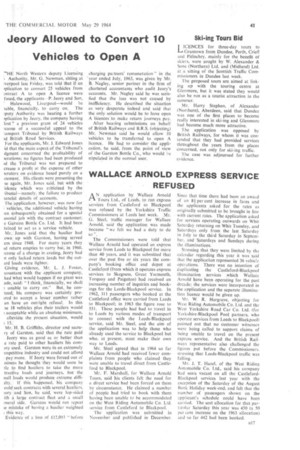Jeory Allowed to Convert 10 Vehicles to Open A
Page 43

If you've noticed an error in this article please click here to report it so we can fix it.
-'HE North Western deputy Licensing
Authority, Mr. G. Newman, sitting at iverpool last Friday, was told that if an aplication to convert 25 vehicles from antract A to open A licence were fused, the applicants—P. Jeory and Son, Halewood, Liverpool—would be table, financially, to carry on. The ;puty Authority was hearing a further tplication by Jeory, the company having lost" a previous grant of 24 vehicles ;cause of a successful appeal to the ransport Tribunal by British Railways id British Road Services.
For the applicants, Mr. J. Edward Jones Id that the main aspect of the Tribunal's dgment concerned the profitability of terations; no figures had been produced id the Tribunal was not prepared to crease a profit at the expense of other )erators on evidence based purely on a itement. His clients were presenting the se again, Mr. Jones said, but with the idence which was criticized by the ibunal—namely, the failure to produce tancial details of accounts.
The application, however, was now for ; vehicles, the additional vehicle having :en subsequently obtained for a special asonal job with the contract customer; e Garston Bottle Co. Ltd, It had been tamed to act as a service vehicle, Mr. Jones said that the haulier had own up with Garston, having served em since 1948. For many years they id return empties to carry but in 1960, :cause of a change in crating. Jeory had n only lacked return loads but the outard loads were lighter.
Giving evidence, Mr. L. J. Foster, countant with the applicant company, ked what would happen if no grant was ade, said: " I think, financially, we shall ;. unable to carry on." But, he conwed, his company was certainly prewed to accept a lesser number rather an have an outright refusal. in this se 18 vehicles plus their trailers would acceptable while an absolute minimum, alleviate the present situation, would ; 15.
Mr. H. B. Griffiths, director and secrery of Garston, said that the rate paid Jeory was as good as or better than e rate paid to other hauliers his cornmy used. Garston were in an extremely )mpetitive industry and could not afford pay more. If Jeory were forced out of isiness he thought they would soon be )1e to find hauliers to take the more tractive loads and journeys, but the nall loads would produce extreme diffithy. If this happened, his company ould seek contracts with several hauliers. ;ory and Son, he said, were lop-sided ith a large contract fleet and a small !neral side. •Garston would not repeat le mistake of having a haulier weighted this way.
Evidence of a loss of £12,093 " before charging partners' remuneration in the 'year ended July, 1963, was given by Mr. B. Nagley, senior partner in the firm of chartered accountants who audit Jeory's ,accounts. Mr. Nagley said he was satisfied that the loss was not caused by inefficiency. He described the situation as very desperate indeed and said that the only, solution would be to have open A licences to make return journeys pay.
After hearing submissions on behalf of British Railways and B.R.S. (objecting) Mr, Newman said he would allow 10 vehicles to be transferred to open A licence. He had to consider the application, he said, from the point of view of the Garston Bottle Co., who would 1,e stipulated in the normal user.




















































































































